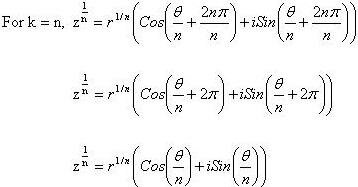Table Of Content
Brush Up Basics
Let z = (a + i b) be any complex number. The nth root of complex number z is given by z1/n where n → θ (i.e. set of rational numbers).
Steps to Convert
Step 1
Convert the given complex number, into polar form.
![]()
![]()
Step 2
Add 2kπ to the argument of the complex number converted into polar form.
![]()
Step 3
Raise index 1/n to the power of z to calculate the nth root of complex number.
![]()
Step 4
Apply De Moivre’s Theorem
![]()
Step 5
Obtain n distinct values. After applying Moivre’s Theorem in step (4) we obtain which has n distinct values. These values can be obtained by putting k = 0, 1, 2… n – 1 (i.e. one less than the number in the denominator of the given index in lowest form).
Therefore n roots of complex number for different values of k can be obtained as follows:

Example to clear it all
Find the cube root of iota i.e. (i1/3)
Let z = i (iota) and n = 3
Step 1
To convert iota into polar form, z can be expressed as
Z = 0 + 0.i
We need to calculate the value of amplitude r and argument θ. Now,

Step 2
Add 2kπ to the argument.
![]()
Step 3
Take cube root of both sides.

Step 4
Apply De Moivre’s Theorem

Step 5
Put k = 0, 1, and 2 to obtain three distinct values.

Thus, three values of cube root of iota (i) are
![]()
It is interesting to note that sum of all roots is zero.
Find the nth root of unity. (1)1/n, Explained here.
Observation to give you insight
(z)1/n has only n distinct values which can be found out by putting k = 0, 1, 2, ….. n-1, n.
![]()
When we put k = n, the value comes out to be identical with that corresponding to k = 0.

Which is same value corresponding to k = 0.
When we put k = n + 1, the value comes out to be identical with that corresponding to k = 1. Thus value of each root repeats cyclically when k exceeds n – 1. Hence (z)1/n have only n distinct values.
